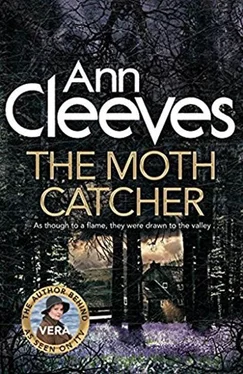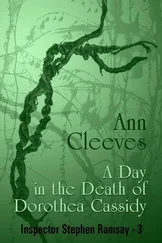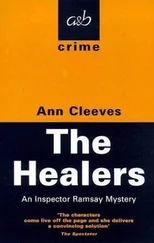‘I called Lorrie out to see them. I love my wife. We were middle-aged when we got together and I’d given up finding anyone to share my life with. Standing there outside our dream house in the company of Lorrie, surrounded by the darkness, was pretty special.’
Lorraine Lucas looked frail and insubstantial. Her skin stretched tightly over her cheekbones. She wore a thin blue smock laced with silver thread, but had wrapped a hand-knitted jacket over the top. Even here in the warm kitchen it seemed she felt cold.
‘Can we get you anything?’ Vera thought the woman needed feeding. She had the ridiculous notion that if they gave her wholesome bowls of soup, hearty and warming, she’d get better.
Lorraine shook her head. Even that seemed to take an effort. ‘Sorry. It’s not such a good day.’
‘Maybe you should tell your husband that you’re not well?’ They could have been on their own at the table. Holly and Joe seemed part of the furniture, along with the rush mat in front of the Aga and the crockery in the dresser.
‘It might come to that. In days, rather than weeks. But I’d prefer to wait until things are back to normal, until you’ve caught your killer. Do you think that might be soon?’
‘Very soon. But I need your help first.’
Lorraine didn’t answer, but gave a little shrug of acquiescence.
‘Tell me how you came to work in the prison.’
Lorraine leaned back in her chair. ‘I was a teacher in a big comprehensive in Essex. Coping. Loving it, actually. The performance. I managed to hold the students’ attention and occasionally there was a star. A kid with passion for art, who saw the world differently from the rest of it and managed to capture the vision.’ She looked up and grinned, self-mocking. ‘Listen to me! I sound like one of those adverts to persuade gullible young people into the profession.’
Vera said nothing. Outside, water dripped from a leaking gutter and she saw that it was raining more heavily.
Lorraine closed her eyes briefly. ‘Then there was a divorce. Nothing unusual. My husband fell for a younger woman, a colleague. It was all rather banal. But it knocked my confidence. Suddenly I couldn’t stand up in front of a class and control the little sods. The anxiety kept me awake at night. I needed a more amenable audience.’
‘And prison provided that?’
‘Offenders are unlikely to kick off, if there’s an officer standing in the corner.’ She paused. ‘Usually it was the adult equivalent of child-minding. Providing meaningful activity, in the jargon, though actually it was pretty meaningless. Sometimes there was a man with a spark of interest. But it was a way of earning a living without the stress of being in a school.’
‘How did you meet Nigel?’ Vera thought the question was hardly necessary. Lorraine was telling her life story, was glad to have the chance perhaps, as her time ran out.
‘It was at a social event. An awards-do for arts and crafts created in prison. Nigel’s company was one of the sponsors and I had a student shortlisted. It was one of those dinners where the food’s dreadful and the speeches go on forever, and everyone survives by drinking too much cheap wine. We sat next to each other and started talking. He was very charming and thoughtful.’ She paused for a moment. ‘It wasn’t love at first sight. Not for me. But I’d had that with my first husband, and look how that had ended.’ Another pause. ‘Honestly, it helped that Nigel was rich. I liked everything that went with that. The lack of worry. The treats, like weekends away in Paris. Meals in the very best restaurants. I got used to being spoiled.’
‘What’s not to like?’ But Vera thought she couldn’t sell her independence so cheaply. ‘You carried on working, though?’
‘Until I was ill. It was a matter of pride, I think. I didn’t want to be entirely a kept woman. And there was no question of children. We were both in our mid-forties when we met.’
Another silence. Outside the drip of water, regular as the ticking of a clock.
‘Did you ever meet Jason Crow?’ The question sounded rather brusque after Lorraine’s gentle telling of her life story, and Vera added, ‘He owns the company that renovated these buildings.’
Lorraine looked up and stared at Vera. Her eyes blue and glittery like her blouse. ‘No, I don’t think so, but Nigel dealt with all that. He’s the practical one in the relationship. He looks after me very well.’
Janet O’Kane looked old. The white streaks in her wire-brush hair seemed more pronounced. Vera decided it had been a stroke of genius to bring the witnesses to the big house. At home it had been possible to define them by their surroundings; here the layer of domesticity had been stripped away from them. Janet seemed tired but very alive, rather wired. And now that she was without her talk of hens, dogs and garden she was clearly fiercely intelligent. Vera saw the woman she’d been before retirement.
‘Is there any news?’ Janet ignored Holly and Joe.
‘I’m afraid we can’t talk about the progress of the investigation.’ Vera realized she sounded just like one of her bosses, a man called Potter. Whenever Vera saw him she had an irrational but almost overwhelming urge to hit him.
‘Does that mean there’s been no progress, but you won’t admit it?’
Vera didn’t answer.
‘This is dreadful. You don’t know how it’s affecting us all. Whenever I go to the village now, people avoid me. Or they want all the gruesome details of that poor woman’s body, and that’s even worse. It’s as if we’ve been touched by the plague.’ Janet pushed her hair back from her face. ‘As if they’re all just waiting for somebody else we know to die.
‘I understand it’s hard for you, because you found her.’
‘It’s hard for all of us.’
‘Can you take me through that day again? I know you’ve given a statement, but it’s important that we know exactly where you all were throughout the afternoon and evening.’ Vera heard the despised Potter’s voice in her head as she spoke. The precise, rather nasal intonation.
‘John and I were at home all day. John was working in his office upstairs. That’s what he calls it. Work. He’s planning another book. But the sales of the last one were disappointing and I doubt very much if he’ll find a publisher.’ The woman’s voice was hard. Vera wondered what had gone on between the couple to change Janet’s attitude to her husband. Perhaps her proximity to violent death had made her see him more honestly.
‘And you?’ Vera asked. ‘What were you doing?’
‘Do you really want to know, Inspector? It’s intensely boring.’ A pause. ‘I took washing from the machine and put it on the line. It dried very quickly, so I brought it in and ironed it. I put clean sheets on our bed – taking care to do it quietly, so John shouldn’t be disturbed. I prepared lunch, ate lunch and washed the dishes.’
‘Did you go out at all?’
‘I took the dogs for a walk. The highlight of my day.’ The words were hard, sharp as slate.
‘Did you go up onto the hill?’ Vera was thinking of the footpath, hidden from the development by a dip in the land, where Shirley Hewarth’s body had been found.
Janet realized the implication of the question. ‘No. I went the other way. Down towards the burn. Are you saying she might already have been dead by then? That her body was already on the hill?’
‘It depends what time you went for your walk.’
‘I went just before lunch. John took the dogs out later in the afternoon.’
‘Then Mrs Hewarth wasn’t on the hill when you went out. She was in her office all morning.’ Vera kept her voice matter-of-fact. ‘Why did your husband go out in the afternoon? Was that usual?’
Читать дальше












